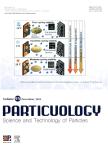Spectra of ZnO nanoparticles under low photon energy excitation
Spectra of ZnO nanoparticles under low photon energy excitation作者机构:College of Materials Science and Engineering South China University of Technology Cuangzhou Guangdong 510641 China State Key Laboratory of Optoelectronic Materials and Technologies Sun Yat-Sen University Guangzhou Guangdong 510275 China
出 版 物:《Particuology》 (颗粒学报(英文版))
年 卷 期:2009年第7卷第6期
页 面:496-500页
核心收录:
学科分类:080903[工学-微电子学与固体电子学] 080901[工学-物理电子学] 0809[工学-电子科学与技术(可授工学、理学学位)] 08[工学] 080401[工学-精密仪器及机械] 080501[工学-材料物理与化学] 0804[工学-仪器科学与技术] 0805[工学-材料科学与工程(可授工学、理学学位)] 080502[工学-材料学] 0803[工学-光学工程]
基 金:supported by the National Natural Science Foundation of China (Grant No.10574165) the Education Ministry of China,the Science and Technology Department of Guangdong Province,the Education Department of Guangdong Province,and the Science and Technology Department of Guangzhou City(2005A10701004)
主 题:ZnO nanoparticles Time resolved Surface emission
摘 要:Time-integrated photoluminescence (PL) spectra between 1.2 and 2.25 eV of ZnO nanoparticles were observed at ambient temperatures when they were excited by a picosecond (ps) laser pulse at a low photon energy of 2.33 eV/532 rim, to show clear red shift when the excitation intensiW increased. Gaussian analysis shows that the red shift is due to increase of the relative magnitudes of the Gaussian combination in the low energy region. Temporal evolution of the dominant emissions exhibited a similar double-exponential decay process, in which the respective two distinct decay durations of 189 ps at the corresponding amplitude of 82% and 2081 ps at 18% were identified. Speculation based on the surfacestate emission due to the large surface-to-volume ratio of nanoscale materials is used to explain the phenomena.



